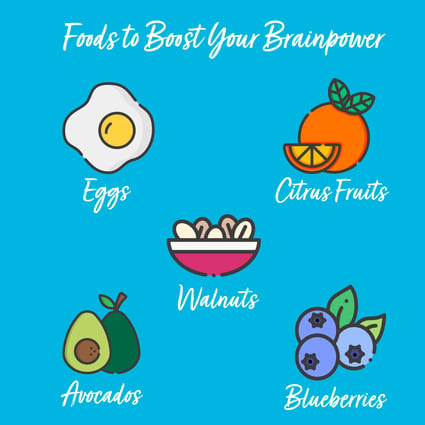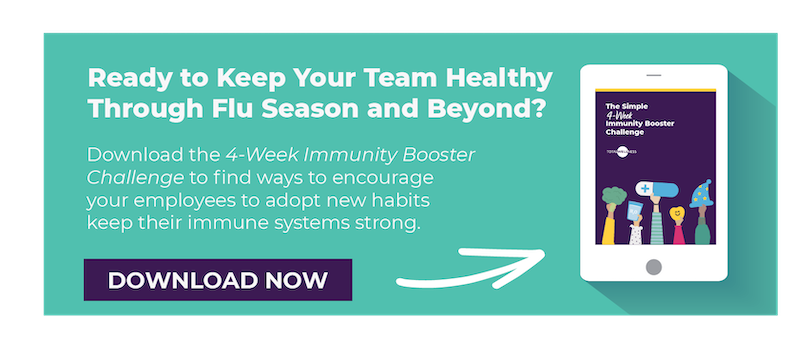 Need a few good reasons to talk about food for brainpower?
Need a few good reasons to talk about food for brainpower?
Here are two: March is National Nutrition Month and Brain Awareness Week is March 15-21.
This month, consider ways you can bring food into your wellness campaigns and discussions. Food is fuel and there’s no doubt putting good fuel into the human-machine that is the body makes it run more efficiently.
Everyone has the power to improve brainpower characteristics like memory, cognitive recall, and more just by changing the way they eat daily.
Ready to feed the brain?
Check out the menu below of the best foods to boost brain health.
Food Variety is Key to Brain Health
As with your overall health, it’s impossible to get all the key nutrients your body needs with just one food. Healthy snacking and eating balanced meals is one way to do it. Experts say that a varied diet with plenty of whole grains, vegetables, fruits, and fats is what keeps your body — from the tips of your toes to the top of your head — healthy.
Skipping processed foods and high-sugar foods will also help keep inflammation away and reduce brain fog. Research also indicates too much sugar, in particular, leads to issues like anxiety and difficulty concentrating.
But, when you focus on incorporating the best ingredients and whole foods into your diet, you’ll certainly see and feel a difference in your health.
Certain foods also contain powerful antioxidants which protect the body from cell-damaging free radicals. In turn, these antioxidants can protect the brain in both the short- and long-term. Thankfully, high-quality foods can do that.
After all, you are what you eat.
Foods for Brainpower and Mental Sharpness
Ready to nix the brain fog and boost your mental sharpness?
Then it’s time to take a look at how to improve your diet starting today. Each of the below foods benefits the body in a different way, so switching it up and trying them all regularly is best. Even if you haven’t tried some of these foods, it’s easy to start bringing them into your diet.
Here’s a look at foods for brainpower to try:
1. Avocados
This perfect salad topping is a healthy source of unsaturated fat thought to support the brain. Monounsaturated fats may reduce blood pressure, a must for minimizing the risk of cognitive decline. Soybeans and flaxseed are also great salad topping options full of healthy unsaturated fats to pair with avocado!
2. Beets
Beetroots, also known simply as “beets” are root veggies with a most impressive nutritional profile. Despite being low in calories, this vegetable has nearly all the vitamins and minerals you need. For heart health, it’s important to note that beets have a high level of nitrates, which may lower blood pressure and minimize the risk of heart failure, heart attacks, and stroke — all of which can impact your brain negatively.
3. Blueberries
These delicious blue fruits are thought to have some of the highest antioxidant levels of anything you’ll find in your produce section. That’s due to the blueberries being related to a grouping of polyphenols antioxidants called flavonoids. Plus, researchers have discovered blueberries have the capability to raise the body’s antioxidant levels, too.
4. Citrus Fruits
Need a good snack to banish brain fog? Try some citrus fruits like oranges, lemons, and limes. Thanks to its rich source of citrus flavonoids that have both anti-inflammatory and anti-oxidative properties, new research shows that citrus can potentially improve cognitive performance. The study, published in the Frontiers in Neuroscience journal in February 2021, encourages the consumption of both whole fruit and 100% juices for the best benefit.
5. Coffee
While most of us reach for coffee for a caffeine boost, it’s also thought to protect against cognitive issues. One 2016 study found the phenylindanes in coffee seem to inhibit toxic proteins tau and beta-amyloid from combining. Too many of these proteins built up in the brain lead to conditions like Parkinson’s disease and Alzheimer’s. If you love your morning cup of java, reach for dark-roasted coffee for the best brain-protective benefits.
6. Dark Chocolate
In need of some focusing power? Snap off a piece of dark chocolate to boost your memory. Research indicates that cocoa flavonoids, in particular, can boost cognitive function by increasing cerebral blood flow. A study published in 2020 showed those who consumed dark chocolate were more likely to have better verbal memory performance. Plus, it boosts your endorphins, putting you in a good mood — always a bonus!
7. Eggs
This versatile food is chock-full of nutrients, protein, and healthy fats. Inside one egg, you’ll get choline, selenium, and B12, all of which promote healthy brain function. Selenium is necessary for coordination, motor performance, and memory. Eat the whole egg to reap the most benefits. The yolk is what contains choline, known for its role in promoting brain function like memory and brain cell communication. And, B12, of course, is what gives you energy and keeps your cells healthy.
8. Fatty Fish
Oily fish like salmon contain a ton of omega-3 fatty acids that are responsible for building cell membranes throughout your body and brain. Fatty fish also has anti-inflammatory and antioxidant properties as well, which can potentially lead to less brain deterioration. One five-year study published in Neurology found older adults who ate seafood once a week did better on thinking skills tests than those who ate less than one seafood dish a week.
9. Green Veggies
If you love salads, this one is probably easy for you. Paired with fellow brain-boosting avocado, you can essentially make a perfect meal aimed at brain health. Greens like kale, collards, and broccoli are full of healthy nutrients including folate, vitamin K, and beta carotene. Because greens have a high level of antioxidants, they are favored for minimizing inflammation along with helping slow cognitive declines.
10. Pumpkin Seeds
This brain food is an ideal healthy office snack to munch on daily. These seeds are rich in nutrients and vitamins like vitamin A, vitamin E, zinc, omega-3, and omega-6 fatty acids. Zinc plays an essential role in brain function and omega-6 fatty acids are necessary for healthy aging. Omega-3 fatty acids are known for supporting healthy brain development and aiding memory.
11. Turmeric
This spice is favored for its anti-inflammatory properties and can be found in a variety of teas and cuisines. The active compound, curcumin, has strong antioxidant benefits, which help keep the brain healthy. Additionally, curcumin increases levels of brain-derived neurotrophic factor (BDNF), which can delay or reverse brain diseases.
12. Walnuts
Nuts have always been a favorite snack of nutritionists and dieticians alike, thanks to being a rich source of healthy fats. Because of the nut’s type of omega-3 fatty acid called alpha-linolenic acid (ALA), they protect arteries and lower blood pressure. Walnuts also may improve memory, too. A 2015 UCLA study found that higher walnut consumption improved cognitive test scores.
Encourage Your Employees to Improve Brain Health
An overall varied diet is a key to getting all the nutrients needed for ultimate brain health. There’s no one supplement or one food that can provide all necessary vitamins, minerals, and nutrients, which is why it’s important to shake things up. We hope this list helps you and your employees do that!
Interested in more articles on brain health? Check out our posts below:
- Daily Activities Guaranteed to Boost Your Brain Power
- Nutrition and Mental Health: What’s the Connection?
- Exercise for Better Brain and Mental Health
Ingesting the right food is just one aspect of keeping the brain healthy. Saying fit, sleeping well, and mentally challenging opportunities are all ways to keep brain health optimal. For more details on ways to keep the brain strong, check out the Cleveland Clinic’s Six Pillars of Brain Health.
Is sugar giving your team brain fog? Help them sign up for the 4 Weeks to Cut the Sweets Sugar Challenge!



